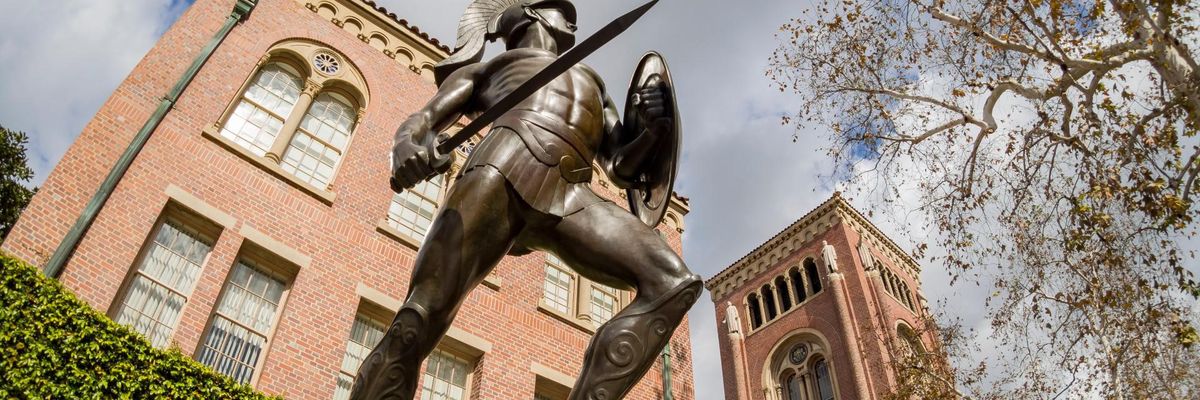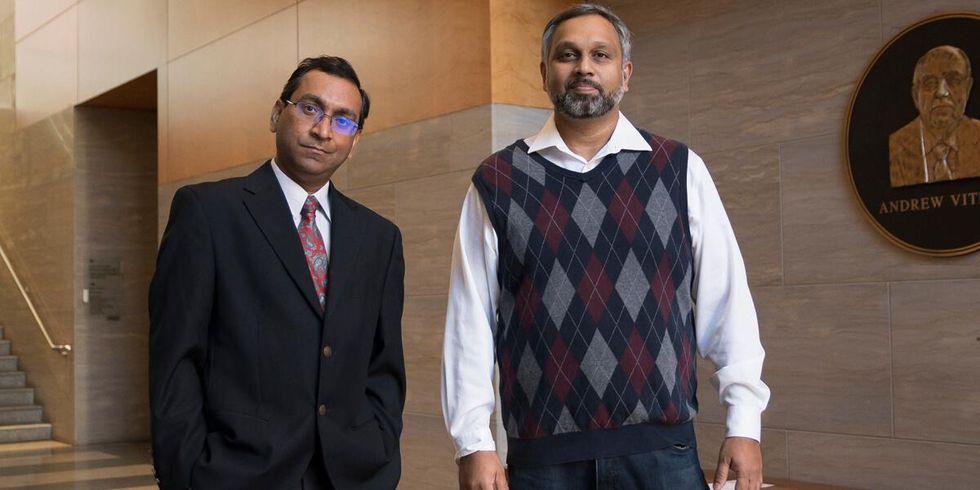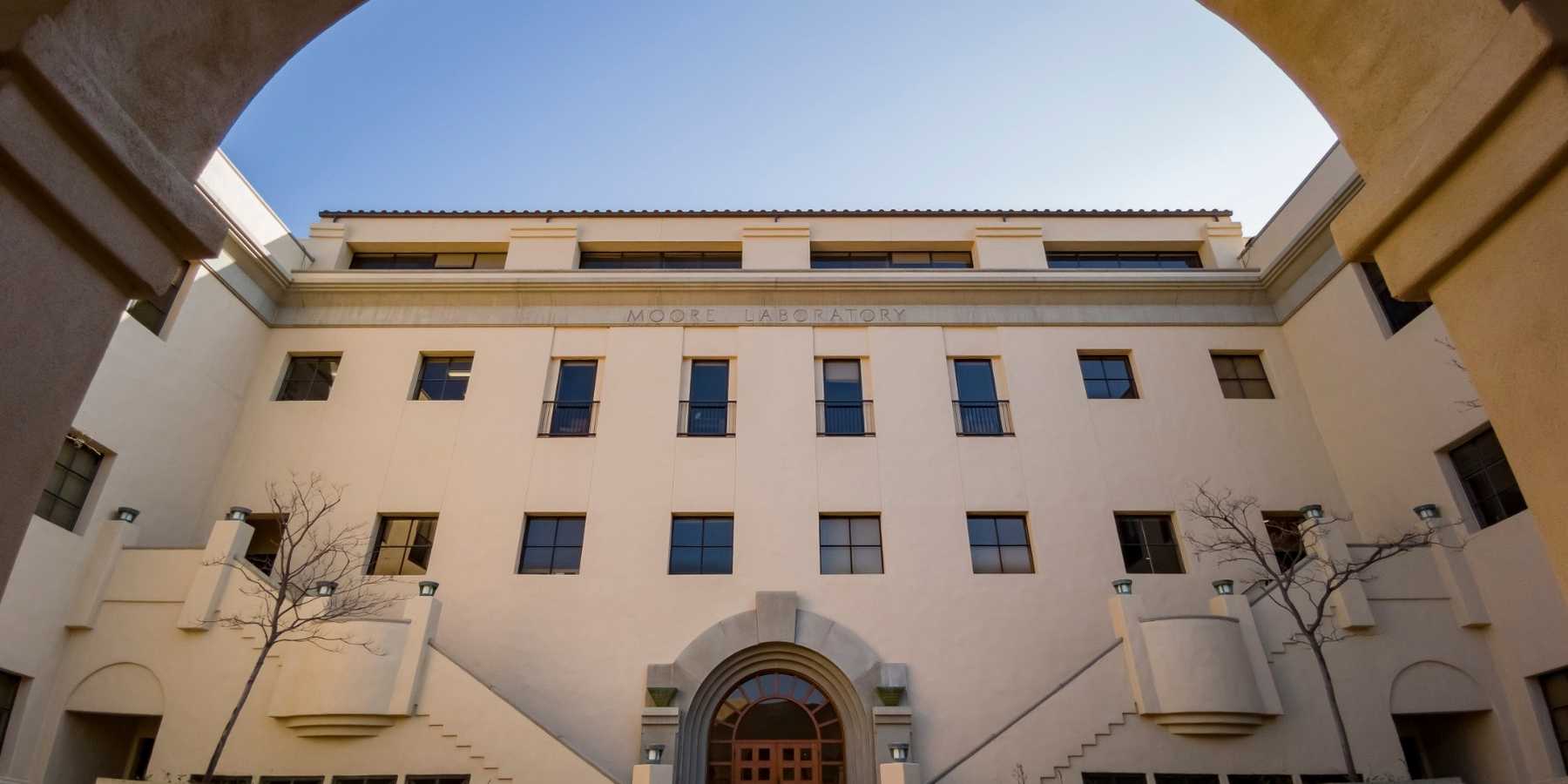

Get in the KNOW
on LA Startups & Tech
X
Photo by Kit Leong/ Shutterstock
USC Expands AI Education With New Research Center, Amazon Partnership
Samson Amore
Samson Amore is a reporter for dot.LA. He holds a degree in journalism from Emerson College. Send tips or pitches to samsonamore@dot.la and find him on Twitter @Samsonamore.
The University of Southern California has unveiled a pair of programs—one in partnership with Amazon—designed to meet the tech industry’s accelerating demand for engineers in the realm of artificial intelligence.
On Tuesday, USC announced the launch of the new Center for Autonomy and AI at its Viterbi School of Engineering. Co-directed by USC professors Rahul Jain and Jyo Deshmukh, the center aims to study and develop AI applications ranging from self-driving cars and autonomous robots.
The university also rolled out a new partnership with Amazon to launch a summer residency program for undergraduate engineering students. Amazon is sponsoring the program, which will see 30 students in science, technology, engineering and mathematics (STEM) disciplines from across the U.S. work with USC faculty during an eight-week on-campus program.
The summer residency is the second recent collaboration between USC Viterbi and the Seattle-based ecommerce giant, after they partnered last year on a joint research center focused on machine learning.
In a statement Tuesday, USC Viterbi Senior Associate Dean for Student Affairs Kelly Goulis noted that Amazon “is one of the largest employers” of the engineering school’s alumni. USC Viterbi Dean Yannis Yortsos told dot.LA that several top Amazon decision-makers have close ties to USC—including Alexa AI Vice President Prem Natarajan, who previously taught at Viterbi and was the founding director of USC’s Computing Forum.
“There is a lot of growth in these areas and I think you will see more,” Yortsos said. “It is conceivable that even at the undergraduate level, some sort of a digital literacy will become as important as other general education requirements.”

According to a USC Viterbi spokesperson, demand among students for a minor in applied analytics has catapulted from fewer than 20 students in 2016 to more than 500 this year, making it one of the most popular minors on campus today. In turn, the university has added 12 new courses that focus on AI or data science and will continue to grow that number moving forward.
Yortsos noted that USC’s focus on AI-related disciplines has grown in conjunction with the tech industry’s demand for engineers. As autonomous applications from transportation to manufacturing expand in use, companies’ demand for talent to develop and troubleshoot such technology is skyrocketing.
In November, USC hosted a program on “safe autonomy and practical AI” that featured participants from major firms in manufacturing and defense, including Toyota, Ford, Ericsson, Lockheed Martin and Northrop Grumman. Yortsos said the government is also interested in tapping USC’s engineering talent, with the campus hosting a workshop alongside the U.S. Army next week and commencing a research partnership with the U.S. Space Force later this month.
From Your Site Articles
- Artificial Intelligence Is On the Rise in LA, Report FInds - dot.LA ›
- USC Gets Funds to Create a Contract Tracing App for Students - dot ... ›
- Amazon Is Building a Machine Learning Research Center at USC ... ›
- Artificial Intelligence Will Change How Doctors Diagnose - dot.LA ›
- Recent AI Applications Show Increasingly Noticable Setbacks - dot.LA ›
- Generative AI is Taking Over College Campuses - dot.LA ›
- How AI Is Advancing and What This Means for the Future - dot.LA ›
- How USC Plans to Teach AI in New Computing School - dot.LA ›
- Heywire Believes AI Could Help Save Struggling Newsrooms - dot.LA ›
Related Articles Around the Web
Samson Amore
Samson Amore is a reporter for dot.LA. He holds a degree in journalism from Emerson College. Send tips or pitches to samsonamore@dot.la and find him on Twitter @Samsonamore.
https://twitter.com/samsonamore
samsonamore@dot.la
Kairos Ventures Raises $58M Fund for Early-Stage Life Sciences Startups
11:58 AM | June 13, 2022
Can Venture Capital Help Unlock 'Underdeveloped' Caltech?
Kairos Ventures, a Beverly Hills-based venture capital firm funding early-stage life sciences companies, announced on Monday that it has closed its third fund with $58 million raised.
Kairos said its new fund has already invested in 27 startups including Vivodyne, a University of Pennsylvania spinout that cultures human tissue for experiments, and Linnaeus, a New Jersey-based cancer therapeutics startup.
Founded in 2015, the venture capital firm is known for backing physical and life sciences startups in their infancy, often as soon as they leave the university research labs in which they were incubated. Kairos initially focused on research coming out of Caltech, Chief Research and Development Officer Alex Andrianopoulos told dot.LA last year, but has since widened its scope to around a dozen other universities and has invested in more than 55 companies.
Kairos also provides no-strings-attached grants, typically ranging between $100,000 to $200,000, to academic researchers, founder and CEO Jim Demetraides told the Wall Street Journal. That approach “builds relationships” between Kairos and those university-stage, would-be startups once they are ready for their first rounds of venture money, Demetraides said, with the venture firm having funded around 120 research programs to date, he told the Journal.
Kairos previously raised $25 million for its first fund and $85 million for its second fund, according to PitchBook Data.
The news comes after another Los Angeles-based, health tech-focused investment firm, Wavemaker 360, raised $64 million for its second venture fund last week.
From Your Site Articles
- Los Angeles Venture Capital News - dot.LA ›
- Kairos Ventures' Alex Andrianopoulos on Investing in Academia ... ›
Related Articles Around the Web
Read moreShow less
Keerthi Vedantam
Keerthi Vedantam is a bioscience reporter at dot.LA. She cut her teeth covering everything from cloud computing to 5G in San Francisco and Seattle. Before she covered tech, Keerthi reported on tribal lands and congressional policy in Washington, D.C. Connect with her on Twitter, Clubhouse (@keerthivedantam) or Signal at 408-470-0776.
https://twitter.com/KeerthiVedantam
keerthi@dot.la
Skyryse Raised $300M+ to Do What Most Startups Can’t
09:26 AM | February 06, 2026
🔦 Spotlight
Hello Los Angeles
LA just minted another aviation unicorn, and it is not because someone built a prettier helicopter demo. It's because Skyryse is trying to do the rarest thing in tech: turn software into something regulators will sign their name to, and that pilots will trust when conditions are at their worst.
El Segundo’s newest unicorn is simplifying the cockpit
Skyryse raised $300M+ in a Series C at a $1.15B valuation. The round was led by Autopilot Ventures and returning investor Fidelity Management & Research Company, with participation from Qatar Investment Authority, ArrowMark Partners, Atreides, BAM Elevate, Baron Capital Group, Durable Capital Partners, Positive Sum, Rokos (RCM Private Markets Fund), and Woodline Partners, among others.

The pitch is bold and deceptively simple. Skyryse is building a “universal operating system for flight,” SkyOS, designed to replace the cockpit’s maze of mechanical controls with a computer-driven system that makes routine flight easier and emergency situations more manageable. The bigger claim is standardization: if you can make the interface and controls feel consistent across aircraft, you reduce training friction, lower pilot workload, and create fewer opportunities for human error when the stakes spike.
The real work starts after the press release
Skyryse says the funding will be used to accelerate FAA certification and scale SkyOS across additional aircraft platforms, including the Black Hawk. That is the hard part, and also the part most startups never reach. Aviation is where software has to prove itself in edge cases, repeatedly, with zero tolerance for surprises, because “mostly works” is another way of saying “eventually fails.”
The bet hiding inside the headlines
If Skyryse clears certification and can port SkyOS across aircraft types the way software ports across devices, it could unlock a new category of safety automation for fleets that cannot afford downtime, confusion, or long training cycles. Emergency response, defense modernization, and industrial aviation are all markets where reliability is the product, and simplicity is the differentiator. In a world obsessed with shipping faster, Skyryse is playing a different game: getting permission to ship at all.
Keep scrolling for the latest LA venture rounds, fund news and acquisitions.
🤝 Venture Deals
LA Companies
- Accrual announced it has raised $75M in new funding led by General Catalyst, with participation from Go Global Ventures, Pruven Capital, Edward Jones Ventures, and a group of founders and industry executives. The company says the raise supports its official launch and continued buildout, alongside early partner firms, investors, and advisors. - learn more
- Morpheus Space secured a $15M strategic investment led by Alpine Space Ventures and the European Investment Fund, with continued support from existing investors, to fuel its next phase of growth. The company says it will use the capital to expand mass-production capacity and its team at its Dresden “Reloaded” facility, helping industrialize its GO-2 electric propulsion systems and meet rising demand from large satellite constellations. - learn more
- Machina Labs raised a $124M Series C to build its first large-scale “Intelligent Factory,” a U.S.-based production site aimed at rapidly manufacturing complex metal structures for defense, aerospace, and advanced mobility. The company says the funding, backed by investors including Woven Capital, Lockheed Martin Ventures, Balerion Space Ventures, and Strategic Development Fund, will help it scale its AI-and-robotics “software-defined” manufacturing approach from breakthrough tech into high-throughput production infrastructure. - learn more
- Midi Health raised a $100M Series D led by Goodwater Capital, with new investors Foresite Capital and Serena Ventures joining and existing backers including GV, Emerson Collective, and others returning, valuing the company at over $1B. The women’s telehealth provider says it will use the funding to scale beyond menopause care into a broader, AI-enabled women’s health platform, expanding access and using AI to personalize care and streamline clinical operations. - learn more
- Mitra EV raised $27M in financing, combining equity led by Ultra Capital with a credit facility from S2G Investments, to expand its “no upfront capital” fleet electrification model. The Los Angeles-based company says it will use the money to grow its shared charging network, roll out additional fleet solutions, and expand into new markets, positioning itself as a fully managed package that bundles EV leasing, overnight charging, and access to shared fast-charging hubs. - learn more
- Plug raised a $20M Series A to scale its EV-first marketplace, following $60M in used EV sales since launching in 2024. The round was led by Lightspeed with participation from Galvanize and existing investors including Autotech Ventures, Leap Forward Ventures, and Renn Global, as Plug positions itself as infrastructure for the coming wave of off-lease EV inventory with EV-native pricing, battery health insights, and faster dealer transactions. - learn more
- Breezy, a Los Angeles-based AI operating system for residential real estate professionals, raised an oversubscribed $10M pre-seed round led by Ribbit Capital, with participation from Fifth Wall, DST Global, Liquid 2 Ventures, O.G. Venture Partners, and others. The company says it will use the funding to strengthen its product and data platform, grow engineering and design, invest in security, and prepare for broader U.S. and international rollout. - learn more
LA Venture Funds
- Upfront Ventures participated in Daytona’s $24M Series A, a round led by FirstMark Capital with participation from Pace Capital and existing investors E2VC and Darkmode, plus strategic checks from Datadog and Figma Ventures. Daytona is building “composable computers” for AI agents, essentially programmatic, stateful sandboxes that can be spun up, paused, and snapshotted on demand so agents can safely run code and explore many paths in parallel at scale. - learn more
- Second Sight Ventures participated in Willie’s Remedy+’s $15M Series A, a round led by Left Lane Capital to fuel national retail expansion and continued product development for its hemp-derived THC beverages positioned as an alcohol alternative. The company says it has already sold 400,000+ bottles in under a year and claims the top spot for online THC beverage sales as it gears up for broader distribution in 2026. - learn more
- Navitas Capital led Cadastral’s $9.5M funding round, with participation from JLL Spark Global Ventures, AvalonBay, Equity Residential, and 1Sharpe. Cadastral says it will use the capital to accelerate product development and expand go-to-market for its vertical AI platform, positioning the product as an “AI analyst in a box” that automates core commercial real estate workflows like underwriting and due diligence. - learn more
- B Capital participated in Lunar Energy’s $232M raise, which the company disclosed as two rounds: a $102M Series D led by B Capital and Prelude Ventures, and a previously unannounced $130M Series C led by Activate Capital. The startup says it will use the capital to rapidly scale home-battery manufacturing and deployments, turning those distributed systems into a grid-supporting virtual power plant as electricity demand surges. - learn more
- B Capital participated in Goodfire’s $150M Series B at a $1.25B valuation, a round that also included investors like Juniper Ventures, DFJ Growth, Salesforce Ventures, Menlo Ventures, Lightspeed, South Park Commons, Wing, and Eric Schmidt. Goodfire says it will use the funding to scale its interpretability-driven “model design environment,” aimed at helping teams understand, debug, and deliberately shape how AI models behave in high-stakes settings. - learn more
- Helena participated in Positron AI’s oversubscribed $230M Series B at a post-money valuation above $1B, alongside strategic investors including Qatar Investment Authority and Arm. The round was co-led by ARENA Private Wealth, Jump Trading, and Unless, and the company says it will use the capital to scale energy-efficient AI inference now and accelerate its next-generation “Asimov” silicon roadmap. - learn more
- Smash Capital participated in ElevenLabs’ $500M Series D, which values the company at $11B as it scales its voice and conversational AI products for enterprise use. The round was led by Sequoia Capital with support from existing backers like Andreessen Horowitz and ICONIQ Capital, plus additional participation including Lightspeed Venture Partners. - learn more
- MTech Capital participated in Pasito’s $21M Series A, a round led by Insight Partners with additional participation from Y Combinator. Pasito says it’s building an AI-native workspace for group health, life, and retirement benefits that turns messy, unstructured plan and census data into a unified layer so carriers and brokers can automate workflows end-to-end, from quoting and enrollment to support and claims. - learn more
- Rebel Fund participated in Ruvo’s $4.6M seed round, led by 1confirmation with participation from Coinbase Ventures and others, as the Y Combinator-backed fintech expands its cross-border payments infrastructure between Brazil and the U.S. Ruvo says it operates like a U.S. dollar account for Brazilians, combining Pix, stablecoins, ACH/wire transfers, and a Visa card in one app to speed up remittances by reducing intermediaries. - learn more
- Rainfall Ventures participated in a seed funding round for Deft Robotics alongside Spring Camp, backing the company’s push to build AI-driven automation tools for manufacturers. The round amount wasn’t disclosed in the announcement, but the funding is positioned to help Deft scale product development and customer deployments in industrial settings. - learn more
- Trousdale Ventures participated in CesiumAstro’s Series C by leading the $270M equity portion of a $470M total growth-capital raise, alongside investors including Woven Capital, Janus Henderson Investors, and Airbus Ventures. CesiumAstro says the broader financing also includes $200M from Export-Import Bank of the United States and J.P. Morgan, and will fund a major U.S. scale-up including a new 270,000-square-foot HQ and expanded manufacturing to accelerate deployment of its software-defined, AI-enabled space communications platforms. - learn more
- Mucker Capital participated in Linq’s $20M Series A, which was led by TQ Ventures to help the company become infrastructure for AI assistants that run directly inside messaging apps. Linq’s platform lets developers and businesses deploy assistants through channels like iMessage, RCS, and SMS, and the company says the funding will go toward expanding the team, building a go-to-market motion, and continuing to develop the product. - learn more
- Sound Ventures participated in Day AI’s $20M Series A, which was led by Sequoia Capital with additional participation from Greenoaks, Conviction, and Permanent Capital. Day AI says the funding will help scale its AI-native CRM platform and support its move into general availability, positioning “CRMx” as a faster, context-driven alternative to legacy systems that turn simple questions into slow projects. - learn more
- Chaac Ventures participated in Arbor’s $6.3M seed round, which was led by 645 Ventures with additional backing from Next Play Ventures, Comma Capital, and angel investors. Arbor is building an AI interview and research platform that captures frontline employee and customer conversations and turns that qualitative “ground truth” into structured operational intelligence leaders can act on quickly, without slow surveys or pricey consultants. - learn more
- B Capital participated in When’s $10.2M Series A, a round co-led by ManchesterStory and 7wire, with new investor Mairs & Power Venture Capital and returning backers Enfield Capital Partners, TTV Capital, and Alumni Ventures. When says it helps employers and departing or transitioning employees navigate health coverage changes by steering people to more affordable alternatives to COBRA through an AI-powered marketplace and targeted reimbursements, with the new capital going toward team growth and expanding into more transition scenarios like Medicare eligibility and early retirements. - learn more
Read moreShow less
RELATEDTRENDING
LA TECH JOBS


